Sedation Dentistry – Lewisville, TX
Breathe Easy at Every Appointment
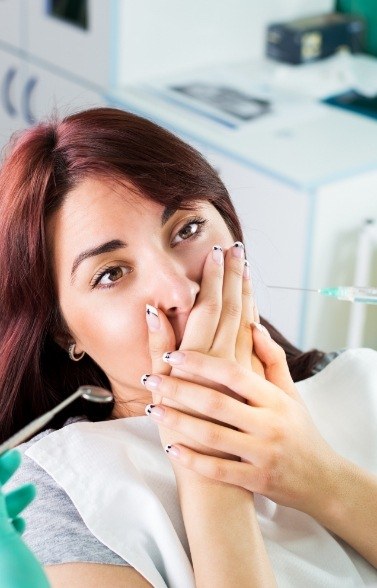
Most people don’t exactly love going to the dentist. In fact, some are downright terrified to the point that they regularly skip out on routine care. Sedation dentistry from our Lewisville, TX dentist is able to calm even the most severe nerves, so a patient can feel relaxed and safe in the chair while Dr. Sehnert and the team work on their teeth. If you’re ready to take the stress out of your dental appointments, get in touch with our team today to ask about sedation dentistry.
Why Choose Sehnert Precision Dentistry for Sedation Dentistry?
- Friendly Dentist That Has Served Lewisville for 20+ Years
- Sedation Options Suited to Your Needs
- Available for Any Procedure
Oral Conscious Dental Sedation
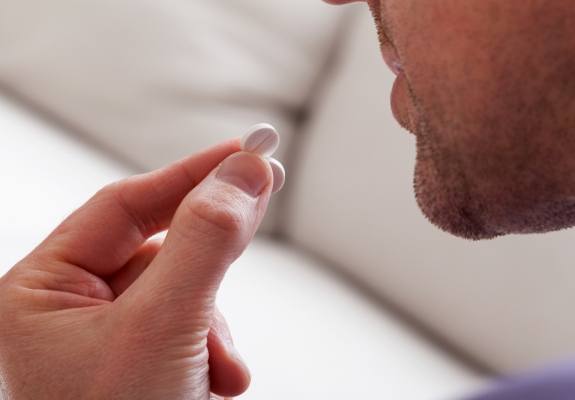
If you could take a pill that would make your dental nerves go away, would you do it? That’s essentially how oral conscious sedation works! Dr. Sehnert will prescribe you medication to take at home on the day of your appointment, and by the time you arrive at the dental office, you’ll already be in a deep state of relaxation. You’ll know what is going on during your visit, but you just won’t be bothered by it, and time will seem to fly. Because of the strength of OCS, it’s required that a trusted person drive you to and from our dental office.
What is Oral Conscious Sedation?

Oral conscious sedation relies on the use of one of several well-known anti-anxiety medications. The type that will be specifically recommended to you will depend on things like your medical history, what other medications you might be taking, and your level of dental anxiety.
It is mostly suggested for patients who have moderate to severe nerves related to dentistry or who need to undergo a more involved procedure like a tooth extraction.
How Does Oral Conscious Sedation Work?
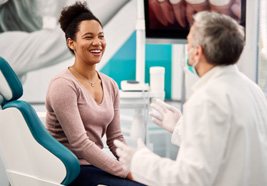
It all starts with a conversation between you and Dr. Sehnert. OCS is usually brought up after a patient has agreed to treatment and is asked if they have any concerns about it. Being a dental office, we work with nervous patients all the time, so we have no problem doing anything we can to ensure someone feels comfortable while in the chair.
After you’re prescribed the medication, you should be driven to our office by a trusted adult, and based on how you’re feeling, you may be asked to take more. Once you are nice and relaxed, the procedure itself will begin.
As touched on above, it can take several hours for OCS to wear off, so you should plan to be driven back home and take the rest of the day off following your visit.
Are You a Good Candidate for Oral Conscious Sedation?
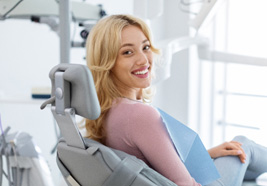
Oral conscious sedation is usually a good fit for patients who:
- Become nervous just thinking about visiting the dentist
- Frequently cancel appointments because of dental anxiety
- Have had negative dental experiences in the past
- Worry that a procedure will cause pain
- Have a sensitive gag reflex
- Can’t leave their mouth open for a long time without being in pain
- Have an issue that makes sitting for long periods uncomfortable
- Need a more advanced procedure
- Want to complete multiple procedures in a single appointment to save time
Nitrous Oxide Sedation
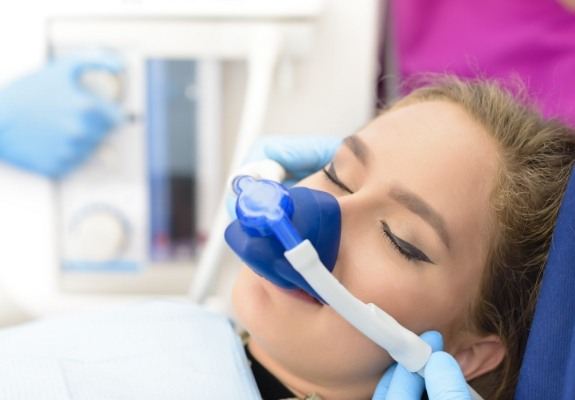
Think you haven’t heard of nitrous oxide before? Then there’s a chance you’ve heard a different name: laughing gas. This mild, but effective, form of dental sedation can create a tranquil, euphoric sensation after just a few breaths, which makes it ideal for those who struggle with dental-related anxiety. If you would like to learn more about nitrous oxide, then read on. Or, get in touch with our Lewisville dental team to find out if you’re a candidate!
Who is a Good Candidate for Nitrous Oxide?
Nitrous oxide is often used to help patients who struggle with dental-related anxiety. However, that’s not its only use! This calming solution can also help patients with special needs, a strong gag reflex, and head/neck/jaw pain in the treatment chair. So, don’t hesitate to schedule an appointment with us if you think you would benefit from having nitrous oxide added to your treatment plan. If you’re healthy and don’t have any conditions that prevent you from breathing in properly, like asthma, then there’s a good chance that you’re a candidate!
How Does Nitrous Oxide Work?
Nitrous oxide is administered once you arrive at our office. You’ll settle into the treatment chair, we’ll place a small nasal mask over your nose, and we’ll ask you to breathe in the gas mixed with oxygen. It only takes a few minutes for the effects to set in, causing any anxiety, stress, and nerves to simply melt away. You won’t be asleep either, so you can ask for the nitrous oxide to be adjusted and respond to any instructions we give you with ease.
Aftercare for Nitrous Oxide
With other dental sedation options, there are lingering effects, like grogginess. That’s not the case with nitrous oxide! The flow of this colorless, odorless gas will stop once we remove the mask. Shortly after, the effects will completely dissipate, allowing you to get straight back to your day. Simply put, the only aftercare instructions you will need to follow will be in relation to the preventive, restorative, or cosmetic treatment you received.
If you want to learn more about nitrous oxide – from if you’re a candidate to what to expect in the treatment chair – don’t hesitate to reach out to us so we can help!
Sedation Dentistry FAQs
How long does it take to recover after sedation dentistry?
The recovery time depends largely on one thing: the type of dental sedation you choose. After all, the effects of nitrous oxide dissipate within a matter of minutes, while the effects of oral conscious sedation typically last for several hours. That’s why patients who opt for the latter need to arrange for someone they know and trust to drive them home after their appointment.
What does it feel like to be sedated at the dentist?
Patients typically say nitrous oxide makes them feel light, euphoric, and completely at ease. Oral conscious sedation is even stronger, so it creates an even deeper sense of relaxation. In both cases, time often appears to pass more quickly, making the time spent in the treatment chair seem shorter as well.
Is sedation dentistry covered by insurance?
Usually, sedation dentistry is considered a “luxury” by dental insurance providers and, as a result, patients need to pay for it out-of-pocket. That said, there are some exceptions. For example, if you or a loved one have cerebral palsy, Parkinson’s, or another disability, then nitrous oxide or oral conscious sedation may be covered. Ultimately, the best thing to do is take a look at the fine print on your plan to familiarize yourself with your benefits and, if you need any assistance, let us know so we can help you navigate the ins and outs of your coverage.
Can dental sedation make you sick?
Since oral conscious sedation is strong, there is a slight chance that you will feel nauseous. That’s why we typically recommend fasting beforehand. Nitrous oxide, on the other hand, is very mild. So, feeling nauseous is quite rare.
Does sedation dentistry make you tell secrets?
In movies and TV shows, you may have seen characters act completely differently while being sedated. As a result, you might be wondering, “Is that going to happen to me?” Don’t worry – even more powerful forms of sedation dentistry aren’t truth serums. In other words, you won’t spend your time in the treatment chair revealing secrets or saying anything you usually wouldn’t.
Am I a candidate for sedation dentistry?
If you struggle with anxiety, stress, or worry during your time in the treatment chair, don’t hesitate to ask us about sedation dentistry! Nitrous oxide is a mild form that’s suitable for patients of all ages, is fast-acting, and is needle-free. If you need a little more help staying calm in the treatment chair, then we may recommend oral conscious sedation instead since it’s a bit more powerful. Ultimately, if you’re interested in adding sedation dentistry to your treatment plan, the best thing to do is schedule a consultation with us so we can review your medical and dental history as well as learn more about your dental needs.
